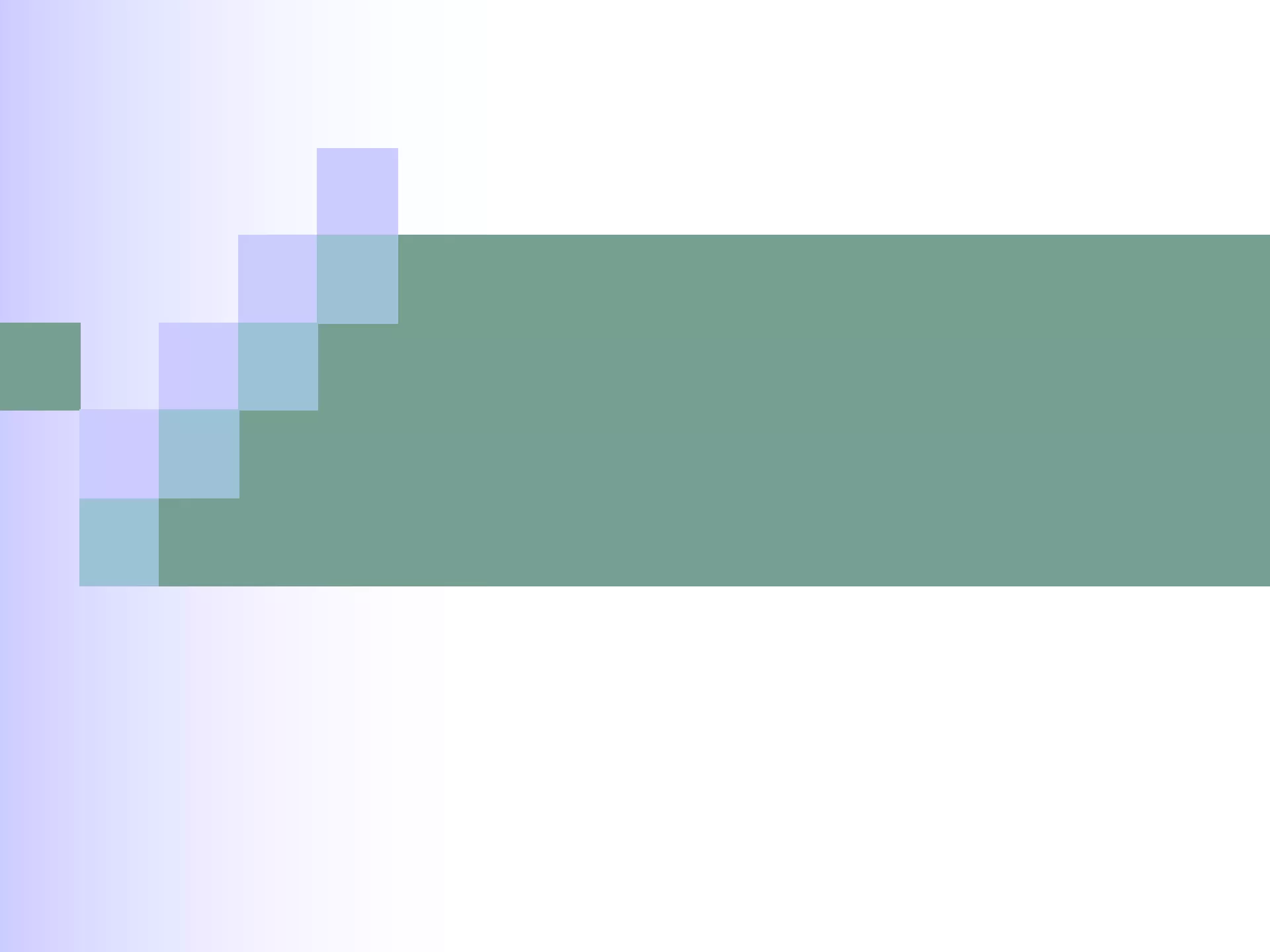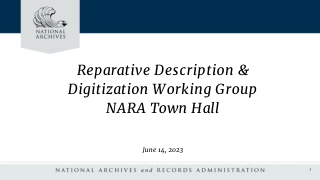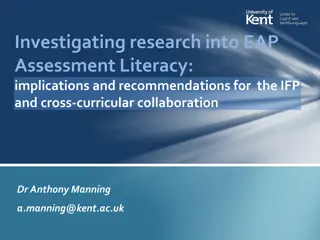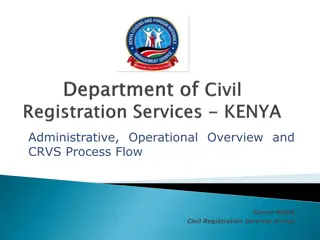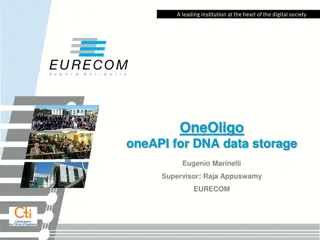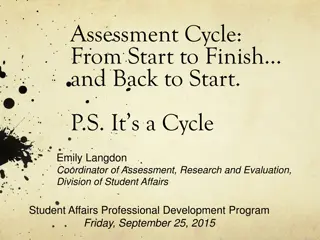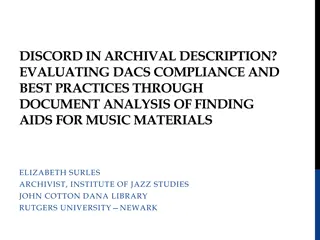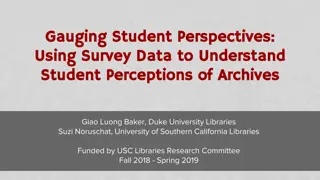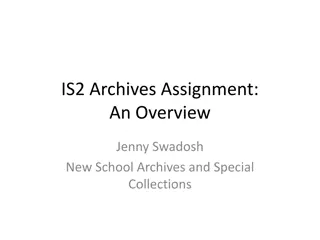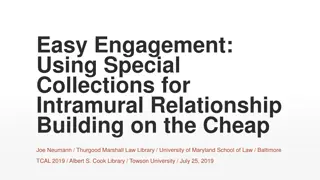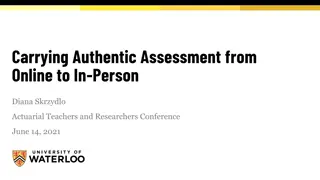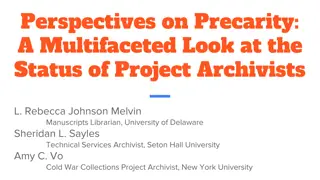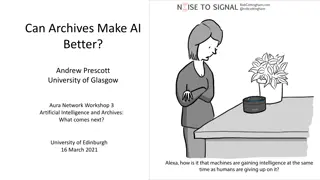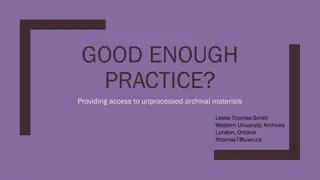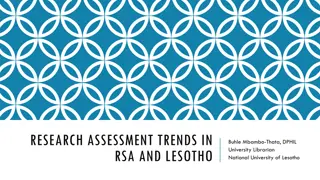Enhancing Archival Research and Assessment: CORDA Perspectives
Delve into the critical discussions on framing research as evaluation and assessment in the archival profession, exploring the evolving methodologies, research agendas, and educational initiatives. Discover the multifaceted approach towards improving archival practices and education.
Download Presentation

Please find below an Image/Link to download the presentation.
The content on the website is provided AS IS for your information and personal use only. It may not be sold, licensed, or shared on other websites without obtaining consent from the author. Download presentation by click this link. If you encounter any issues during the download, it is possible that the publisher has removed the file from their server.
E N D
Presentation Transcript
Framing Research as Evaluation and Assessment Introducing CORDA Paul Conway, University of Michigan Jennifer Gunter King, Emory University
Provocative Ideas Archivists don t do research and rarely ever have. Archivists have a long tradition asking and answering good questions about of what we do, who we serve, and our impact in the wider world. Archivists need better tools for doing rigorous assessment and evaluation and then saving and sharing the results (widely). corda@archivists.org 2 2 August 2019
What is Research? John W. Creswell corda@archivists.org 3 2 August 2019
The Archival Knowledge Base Published literature A growing number of journals peer review, commitment to open access Decades of publishing in book form sole author, multi author, chapter books, text books, assembled works Counting and measuring From Ernst Posner (1956) forward surveys and censuses Reporting, framing, agenda setting Planning and Building Goals and Priorities (in earnest since mid-1980s) Agenda setting for the profession and SAA corda@archivists.org 4 2 August 2019
Research Issues and Methods Cox (1992) and Conway (2013) corda@archivists.org 5 2 August 2019
Three Waves of Research Agendas The Archival Profession 1986-1991 Appraisal Richard Cox and Helen Samuels Management Paul H. McCarthy Users and Use Lawrence Dowler Electronic Records Margaret Hedstrom Research and Education (2000 to present) SAA Task Force CORDE (2017- to present) Diversity & demographics; Metrics and institutions; Functional needs assessment; Inclusive collaboration; Audience building corda@archivists.org 6 2 August 2019
Research for/in Archival Education Eric Ketelaar: Archivistics saving the profession (2000) Education needs research, and research needs education (333). Archival Education and Research Initiative 1980s to present Building a cadre of faculty (Burke, Conway, and onward) Yakel, Gilliland and McKemmish on research infrastructure Research and Archival Education Curricula (2000 onward) Multiverse, DigCCur and digital curation, etc. Graduate Education Guidelines Avoiding accreditation but supporting archival identity corda@archivists.org 7 2 August 2019
Institutional Evaluation Ebb and Flow 1. Legal Authority and Purpose 2. Governing Authority and Administration 3. Financial Resources 4. Staff 5. Physical Facilities 6. Building Archival and Manuscript Holdings 7. Preserving Archival and Manuscript Holdings 8. Arrangement and Description 9. Access Policy and Reference Services 10. Outreach and Public Programs Principles, 1982 McCarthy Workbook, 1989 corda@archivists.org 8 2 August 2019
A Pitch for Evaluation & Assessment Principles-based requiring a framework of issues but no explicit agenda. Bottom up finding priorities from the needs of the profession Practice-based rigorous and systematic but not dependent on hypotheses Open, transparent, and shared most likely through a flexible digital repository platform Two-way collaboration with the academy modeled on the research-clinic system Respectful of the wall/moat between formal scholarship and assessment activities Realistic about the grand challenges of the archival community Pragmatic about archives as a site of inquiry Strategic about contracting for studies with the academy corda@archivists.org 9 2 August 2019
CORDA Origin Story 2016: Dennis Meissner SAA presidential address, Bare Necessities 2016: President Meissner Proposal for a Committee on Research and Evaluation (CORE) May 2017: SAA Council charged the Task Force on Research/Data and Evaluation (TF- CORDE) comprised of Chair Michelle Light and member Sarah Buchanan, Mahnaz Ghaznavi, Dennis Meissner, Daniel Noonan, and Stacie Williams November 2018: SAA Council establishes Committee on Research, Data and Assessment March 2019: CORDA launched corda@archivists.org 10 2 August 2019
The CORDA Charge The Committee on Research, Data, and Assessment provides access to significant and useful data and research about SAA, American archives, and their users that evidence the value of archives for society and help us improve our services to SAA members and to our consumers. The Committee will work to conduct or support relevant research and to create, gather, and preserve data bydirecting and engaging in several areas of activity . www2.archivists.org/governance/handbook/section7/groups/Research- Data-Assessment corda@archivists.org 11 2 August 2019
CORDA Members Paul Conway, University of Michigan (co-chair) Jennifer Gunter King, Emory University (co-chair) * Sarah Buchanan, University of Missouri Columbia Courtney Dean, University of California, Los Angeles Amanda Hawk, Louisiana State University, Baton Rouge Cristina Horak, Federal Reserve Bank of Dallas Chris Marino, Environmental Design Archives, UC Berkeley * Dennis Meissner, Retired Erin Passehl Stoddart, University of Oregon Sarah Pratt, Simmons University Ricky Punzalan, University of Maryland * Member of Task Force-CORDE corda@archivists.org 12 2 August 2019
CORDA Priorities Standardized Tools for gathering and analyzing data Centralized repository Training on gathering, analyzing, interpreting and using data Up-to-date basic facts and figures about archives and archivists Research Priorities corda@archivists.org 13 2 August 2019
CORDA Priorities A Three Year Plan We hope you will join the Committee on Research, Data and Assessment Join us on Sunday from 12:00 1:15 pm for a noon-time forum and brown bag to discuss priorities for Year 1 Year 2 Year 3 and beyond We will share more on how you can be involved and participate! corda@archivists.org 14 2 August 2019
Thank you! Contact us: corda@archivists.org
References [1] AERI. (2011). Educating for the Archival Multiverse. American Archivist 74 (1): 69-101. * Benoit, Edward & Donald C. Force. (2019). One Size Does Not Fit All: Graduate Archival Education in the Twenty- First Century. American Archivist 82 (1): 24-52. Code of Federal Regulations. 45 CFR 46.102(l). Public Welfare: Protection of Human Subjects: Definitions for purposes of this policy: Research. https://www.ecfr.gov/cgi-bin/text- idx?SID=aae75c7cb17f345fd554e5cfd55df0c0&mc=true&node=se45.1.46_1102&rgn=div8 * Conway, Paul. (1986). "Facts and Frameworks: An Approach to Studying the Users of Archives." American Archivist 49 (Fall): 393-407. * Conway, Paul. (1987). Perspectives on Archival Resources: The 1985 Census of Archival Institutions. American Archivist 50 (2): 174-191. * Conway, Paul. (2013). New Culture of Scholarship: An Analysis of North American Archival Research Articles, American Archivist Online Supplement to Volume 74 (306): 1-15. * Cox, Richard. (1986). Professionalism and Archivists in the United States. American Archivist 49 (3): 229-247. * Cox, Richard. (1994). An Analysis of Archival Research, 1970-92, and the Role and Function of the American Archivist. American Archivist 57 (2): 278-288. * Creswell, John W. (2008). Educational Research: Planning, conducting, and evaluating quantitative and qualitative research (3rd ed.). Upper Saddle River: Pearson. * Creswell, John W. and Vicki L. Plano Clark. (2011). Designing and Conducting Mixed Methods Research (2nd ed.). Los Angeles: Sage. * Duff, Wendy, Elizabeth Yakel, Helen Tibbo, Joan Cherry, Aprille McKay, Magia Krause, & Rebecka Sheffield. (2010). The Development, Testing, and Evaluation of the Archival Metrics Toolkits. American Archivist 73 (2): 569-599. * Gilliland, Anne, McKemmish, Sue M., & Lau, Andrew J. (2017). Research in the Archival Multiverse. Clayton Victoria AUS: Monash University Publishing. * Gilliland, Anne. & McKemmish, Sue. (2004). Building an Infrastructure for Archival Research. Archival Science 4 (3- 4): 149-197. https://doi.org/10.1007/s10502-006-6742-6 corda@archivists.org 16 2 August 2019
References [2] * Grimard, Jacques & Pag , Lucie. (2005). Towards Program Evaluation in Archives. Archival Science 4 (1-2): 69-125. https://doi.org/10.1007/s10502-005-6992-8 * Grimard, Jacques. (2004). Program Evaluation and Archives: Appraising Archival Work and Achievements. Archivaria 57 (Spring): 69-87. * Hedstrom, Margaret. (1991). Understanding Electronic Incunabula: A Framework for Research on Electronic Records. American Archivist 54 (3): 334-354. * Huvila, Isto. (2008). Participatory archive: Towards decentralised curation, radical user orientation and broader contextualisation of records management. Archival Science 8 (1): 15 36. Katuu, Shadrack. (2015). "User studies and user education programmes in archival institutions", Aslib Journal of Information Management 67 (4): 442-457. https://doi.org/10.1108/AJIM-01-2015-0005 * Ketelaar, Eric. (2000). Archivistics Research Saving the Profession, American Archivist 58 (4): 494- 507. Linn, Mott. (2015). Not Waiting for Godot: The History of the Academy of Certified Archivists and the Professionalization of the Archival Field. American Archivist 78 (1): 96-132. McCarthy, Paul H. (ed.). (1989). Archives Assessment and Planning Workbook. Chicago: Society of American Archivists. https://www2.archivists.org/sites/all/files/ArchivesAssessPlanWkbkAug2010.pdf Meissner, Dennis. (2017). Bare Necessities. American Archivist 80 (1): 6-18. OECD. (2015). Frascati Manual 2015: Guidelines for Collecting and Reporting Data on Research and Experimental Development, The Measurement of Scientific, Technological and Innovation Activities, OECD Publishing, Paris, https://doi.org/10.1787/9789264239012-en Palm, Charles. (1988). Introduction to Archival Research Agendas. American Archivist 51 (1-2): 23-27. Posner, Ernst. (1957). What, Then, Is the American Archivist, This New Man? American Archivist 20 (1): 3-11. * Rhee, Hea Lim. (2015). Reflections on Archival User Studies. Reference & User Services Quarterly 54 (4): 29-42. corda@archivists.org 17 2 August 2019
References [3] SAA. (1980). Report of the Task Force on Institutional Evaluation. SAA Newsletter, January 1980, pp. 7-14. https://www2.archivists.org/node/21118 SAA. (1994). Guidelines for Evaluation of Archival Institutions. https://www2.archivists.org/groups/standards-committee/guidelines-for-evaluation-of-archival-institutions SAA. (2017). Task Force on Research/Data and Evaluation. Recommendation to Establish a Committee on Research, Data, and Assessment. https://www2.archivists.org/sites/all/files/1118-IV-A-TF- CORDE_0.pdf SAA. (2018). Committee on Research, Data, and Assessment. Charge. https://www2.archivists.org/governance/handbook/section7/groups/Research-Data-Assessment * Stephenson, Mary Sue. (1991). Deciding Not to Build the Wall: Research and the Archival Profession. Archivaria 32 (Summer): 145-151. Tansey, Eira. (2015). The landscape of archival employment: A study of professional archivist job advertisements, 2006-2014. Archival Practice (2). http://libjournal.uncg.edu/index.php/ap/article/view/1084 * Ciaran B. Trace & Carlos J. Ovalle. (2012). Archival Reference and Access: Syllabi and a Snapshot of the Archival Canon. The Reference Librarian 53 (1): 76-94, DOI: 10.1080/02763877.2011.596364 Wilczek, Eliot & *Heather Soyka. (2018). The Formulation of Grand Challenges within AERI Scholarship, 2009-2018. Presentation slides delivered at SAA Research Forum, August 2018. https://www2.archivists.org/sites/all/files/102_saaresearchforum_2018_presentation_wilczek_live.pptx * Yakel, Elizabeth. (2000). Introduction: Graduate Level Archival Education Comes of Age. American Archivist 63 (2): 220-223. * Yeo, Geoffrey. (2018). Research in the Archival Multiverse (review). American Archivist 81 (1): 249- 253. corda@archivists.org 18 2 August 2019
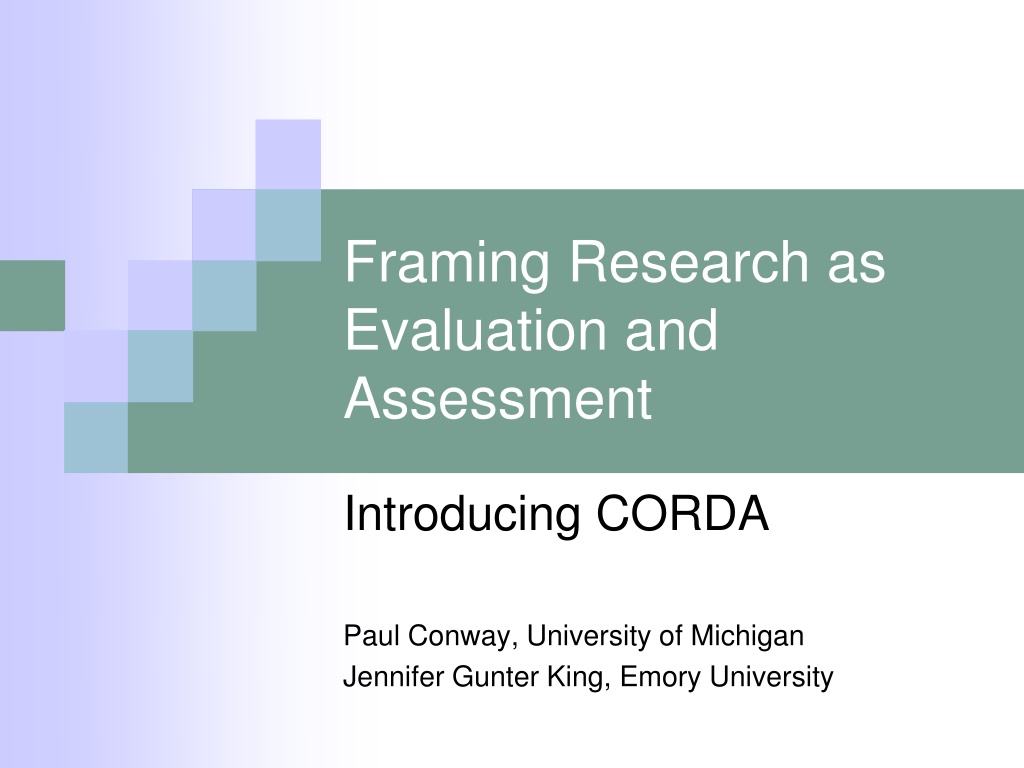
 undefined
undefined